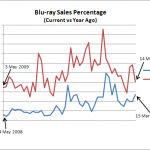Weekly News Roundup (28 March 2010)
A relatively quiet week either because of a serious lack of news or a serious lack of interest from yours truly in finding and posting news. Also didn’t manage to finish the PowerDVD 10 review (it’s a third done, I promise!), again probably due to a lack of interest (not a lack of interest in the new PowerDVD version though, which, although I’m kind of giving away the ending here, is pretty nice). Anyway, let’s get through the available news quickly today because I’m sensing my lack of interest growing yet again …

Let’s start with copyright news. The Viacom vs YouTube stoush (or fight, for you non Australian/NZ readers) was the focus of a couple of news stories this week, thanks to court documents that are now public.
Viacom presented several very damaging internal YouTube emails, many from before they were purchased by Google, that made it pretty obvious the YouTube operators were aware of the piracy problem, and didn’t really want to do too much about it because it might hurt their business (which, basically, was trying to get YouTube popular as quickly as possible so they can sell it for a good price). If YouTube are to lose this trial, then these emails will have been key, I think. Some of them even pointed to the fact that one of the founders may have uploaded infringing material himself, although I don’t think this will be as damaging as the stuff where the founders discuss how getting rid of the pirated stuff will mean that the majority of their traffic will disappear overnight. And all that stuff about wanting to increase visitor rates so they can get a quick sale provides the financial motive behind “allowing” piracy to continue.
YouTube tried to fight back with claims that Viacom employees secretly uploaded infringing videos to the website for promotional reasons, sometimes even disguising the video by making it poorer quality as to generate user buzz. I don’t think this is any surprise, just like it isn’t much of a surprise that millions and millions of dollars are spent on creating viral videos made to look like home made amateur stuff. For me, the crux of the issue is damages. Did the upload of infringing videos damage Viacom? Well, if their own employees were made to upload videos themselves, then that would suggest that not much damage, and in fact, benefits are reaped from the action. Of course, YouTube also benefits from ad revenue and such, but companies like Viacom can’t have it both ways. Would Viacom like it if YouTube banned all postings related to Viacom content on YouTube tomorrow? If the YouTube uploads ever become a replacement for watching the shows on TV, or buying them from iTunes or on DVDs, like torrents, then perhaps Viacom has a serious issue. But if it’s just clips, then that feels to me like free advertising. I can understand why rights holders like Viacom are scared about this, because even if it is advertising, they are losing control. Of course, YouTube now gives rights holders much more control over content, and have been much more aggressive in taking down content, so a large part of the lawsuit is no longer an ongoing concern. And a good chunk of the most popular videos now contain much more original work than before. It’s very possible that had Viacom not launched a lawsuit, they wouldn’t bother launching one given the current situation, but this action is still very much about what happened before, and YouTube might still get into trouble for that.
The rest of the week’s copyright stories were about PC gaming DRM again. Undeterred by the public backlash against Ubisoft’s use of “always-on Internet” DRM, EA copied the system for the game Command & Conquer 4, but reports of problems with the DRM system sprang up immediately after release, so much so that EA had to set up a dedicated thread on their forum to deal with it. Both systems require an active Internet connection, and any drop outs or even a simple routing error means the game stops dead and you can retry the connection, or quit the game, and any unsaved progress is most likely lost. What I find irresponsible is that these companies were well aware users could lose game progress, and yet didn’t bother to design a “constant save” system, where the game progress is automatically saved at short intervals to prevent loss of progress. The fact that EA’s own website editor described the DRM as a “fail”, because he lost saved progress as well, shows just how badly this whole thing has been handled. But then again, if companies like Ubisoft or EA truly cared about the paying gamer’s playing experience, or at least cared more about it than some kind of crusade against piracy, then they would never have created such a flawed system which, time and time again, has shown that it just doesn’t work for many reasons (one is that Internet technology is not stable and mature enough yet for such a system to work).
One of the major reasons why this kind of system won’t work is also on the server end, because nobody, not even the big website like Google and Yahoo with their billion dollar hosting complexes can guarantee the kind of uptime that can serve gamers around the world 24/7, 365. Ubisoft’s claim that their DRM servers were attacked shows that servers go down and go down for long periods sometimes. Ensuring they’re always up will require a huge amount of money and effort, probably costly enough to make this exercise not really worthwhile to game publishers, and this is where they will cut corners and the paying gamer suffers as a result. Ubisoft, in a response to the backlash, has offered affected customers free downloadable content or a choice of free games, but that just proves that even Ubisoft knows what’s happened isn’t acceptable, and it still doesn’t solve or prevent future downtime. If you’re going to introduce such a system, then at the very least, you have to guarantee that everything works flawlessly at your own end.

Not much happening in HD/Blu-ray world. I suppose I should post an update on the Blu-ray market share situation, for those not following my forum thread on this very issue. The summary is that Blu-ray is doing very well at the moment.
The slightly more detailed answer is that Blu-ray market share has at least double since this time last year. The huge range of hit releases towards the end of 2009 really helped, with a greater concentration of A-list releases due to the preceding writer’s striker that delayed a couple of developments and releases. But largely, and this is backed up regularly in the stats, it’s all down to pricing. Whenever there is a sale of certain titles, these titles now consistently outsell the DVD versions, sometimes by such a huge margin that the DVD version might as well not exist. This is not surprising because in these sales, the Blu-ray version of the movie are often cheaper than the DVD version. Add to the fact that some users are obviously upgrading their collection from DVD to Blu-ray, and that the DVD version has been on sale forever for some of these movies (nearly full saturation, for some of them), it then becomes less surprising that the Blu-ray version can outsell the DVD version by 10 to 1 at times. For new releases, the difference between DVD and Blu-ray pricing has reduced as well, and sometimes the Blu-ray version is cheaper than the equivalent DVD edition (the Blu-ray version usually has the same amount or more content than the 2 disc DVD edition), and so it makes the decision much easier for consumers that already have Blu-ray players. Star Trek, District 9 are two titles that come to mind with this kind of pricing, and market share were close to 50%. But when the pricing differences are larger, in that the DVD edition is much cheaper, then Blu-ray market share drops, but is still higher than this time last year. So this evens out to make Blu-ray market share double what it was a year ago, and DVDs are still outselling Blu-ray’s by between a 9-to-1 and 8-to-1 margin. Look at the market share stats for selected individual Blu-ray movies, and you would think that Blu-ray’s market share is now greater than DVD’s.
The Lord of the Rings Trilogy Blu-ray protest is still going strong, and I would really love to see the sales figures and see if it has been affected by people’s displeasure at having to double-dip (or is that quintuple-dip). Certainly, the Amazon.com sales rank, of between 50 and 60 (which translates to around 15 to 20 on the Blu-ray sales charts), suggest that it isn’t selling as well as it should, because when they first announced LOTR on Blu-ray, I thought that this would be something every single Blu-ray owner would buy and would hit number one as soon as pre-orders were up. Of course, it might still happen, since Amazon is only one source, and there are many who don’t care about the extended edition (and those that do care, but are too impatient to wait).
And while I haven’t reported it here, I’ve just been researching the Panasonic plasma black level problem. For those that don’t know, many Panasonic plasma owners found that the black level of their sets suddenly increased once the TV has been viewed for a number of hours (300, 500, 1000 …), in that the black blacks become dark gray. What appears to have happened is that the software that adjusts the voltage levels being fed to the plasma cells is “not optimized”. The voltage needs to be increased over time to prevent plasma cells from locking up, until the cells stabilize around after 3 years or so. Instead of increasing voltage slightly to prevent the cells from locking up, the increased was too much and too sudden, and so increased the black levels unintentionally. While black levels do change even when the voltage adjustment is correct, it should be so minimal as to make it virtually impossible to detect via normal human vision.
The confusion is compounded by the fact that some people will notice it, while others won’t, as it depends on your viewing conditions. For example, those that watch TV in complete darkness will notice is more than those that watch with ambient lighting. Many purchased the Panasonic because of its superior blacks, so it’s understandable why many feel disappointed. At first, people felt that this could be addressed through a firmware update, but Panasonic has now said that this is intentional and not a problem at all, although at the same time stating they’ll do things different for the to be released 2010 models. But because this problem is hard to spot for some, it’s still unknown whether it affects all Panasonic models, in all territories, of just the 2008/2009 Panasonic models in the US.
I’m in the market for a new plasma, and this is disappointing news, since I had my eyes set on a Panny. But between the Samsung “buzzing” problem, the expensive LED LCDs with their limited viewing angle and blooming effect, and the now extinct Pioneer Kuro, there’s not much to choose from, and that the Panasonic, even with the potentially buggy software, might still be the best performer for your money (obviously not the ultra expensive models, which also seems to suffer from the same problem). The only other alternative is to wait for the new 2010 models to be released, then wait until somebody has managed to test it for a few thousand hours, and see if it suffers from the same problem.
![]()
And finally in gaming, Nintendo says the PlayStation Move is very much “Wii-Too”. This could be in response to Sony’s PlayStation commercial which mocks both the Wii and Natal, but the statement made by Nintendo America’s President might have preceded the ad in question.
I think if you ask the average Joe, who hasn’t read up on the Move, I think you’ll get a similar response. Is this a bad thing? Maybe not. It makes it easier to sell the concept, since it’s already a widely accepted one, but it also makes it harder to stand out, even though there are clear differences between the two systems.
But in the end, only the games will determine which succeeds or fails. If the Wii has taught us anything, is that it’s not wise to get caught up in the technology of it all. The games are still all that matters, and nobody has cracked it except for Nintendo at the moment.
And that’s about all the interest I can muster for today. See you next week.




